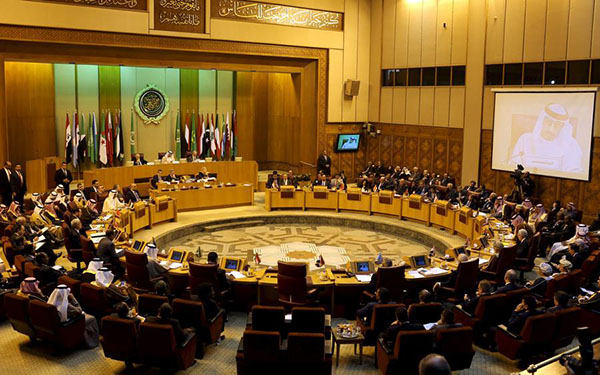Saudi senior journalist: Time to work more closely with Riyadh
Updated: 2016-01-19 08:32
By Ayman Alhammad(China Daily)
|
||||||||
 |
|
A general view of the Arab foreign minister's meeting at the Arab League in Cairo, Egypt, January 10, 2016. [Photo/Agencies] |
The Middle East, a region of major strategic importance for China, is experiencing the most political and security volatility since World War II. It faces tensions and challenges of partition and dismantling plans, terrorism and sectarian militia, and collapse of states and deterioration of political institutions.
Given these challenges, China must look with Confucius rationale at its role as an important player in the United Nations Security Council to shoulder responsibilities in areas beyond its boundaries that are suffering from the increased US involvement in East Asia and the implications of US attempts to implement its "pivot to Asia" strategy.
By contrast, the Silk Road Economic Belt, as part of the Belt and Road Initiative which also includes the 21st Century Maritime Silk Road, proposed by Chinese President Xi Jinping, sees the Middle East as a necessary geographic bridge in China's official scheme, couched with a historical nostalgia to make China a world pivot at all levels. But this initiative, we believe, will face headwinds and is difficult to attain unless Beijing coherently involves itself in the region's affairs and looks deeply into its relationship with Saudi Arabia which has reliable strategic ties with China.
Nevertheless, the challenge of terrorism dominating the region may also affect the Chinese project unless China coordinates its efforts with Saudi Arabia, with its longstanding experience in fighting terrorism at security and intellectual levels with strategies directed to combat the spread of extremist ideology that threatens countries in the region that have friendly relations with China.
The role of China in restoring peace and stability in the Middle East, away from the interventions and military projects dreadfully dominating the region, is most welcome, particularly because Beijing has a project which is aimed at spreading prosperity and development in the region, unlike those with unknown objectives that foment violence and radicalism.
Moreover, China's approval of and support for Security Council Resolution No 2216 under Chapter 7 on Yemen is part of its role to maintain peace through the UN.
The Riyadh-Beijing relationship is of great importance for the Saudi leadership, which views the bilateral ties as distinctive and viable that is reflected in the trade volume of the two countries. But this is not enough for building a sustainable relationship between the two countries. Encouraging knowledge and expanding cultural exchanges are significant for enhancing strategic ties between the two countries and for refuting the mistaken views on the Sino-Saudi relationship created by some media outlets and research groups.
Riyadh, on its part, does not want its relationship with Beijing to be that of oil dependence - oil should remain a subsidiary, not the major, factor in bilateral ties. Saudi Arabia aims to develop an economy based on knowledge and not only on oil. China is having an appreciable experience in this context and Saudi Arabia needs to utilize this experience.
The region is dominated by volatile political and security situation and challenges difficult to overcome. This requires China to work more closely with friends who have influence in the world and a good reputation in the region and the Islamic world.
The author is an editorial writer at Al Riyadh newspaper.
- Global health entering new era: WHO chief
- Brazil's planning minister steps aside after recordings revelation
- Vietnam, US adopt joint statement on advancing comprehensive partnership
- European border closures 'inhumane': UN refugee agency
- Japan's foreign minister calls A-bombings extremely regrettable
- Fukushima impact unprecedented for oceans: US expert

 Stars of Lijiang River: Elderly brothers with white beards
Stars of Lijiang River: Elderly brothers with white beards
 Wealthy Chinese children paying money to learn British manners
Wealthy Chinese children paying money to learn British manners
 Military-style wedding: Fighter jets, grooms in dashing uniforms
Military-style wedding: Fighter jets, grooms in dashing uniforms
 Striking photos around the world: May 16 - May 22
Striking photos around the world: May 16 - May 22
 Robots help elderly in nursing home in east China
Robots help elderly in nursing home in east China
 Hanging in the air: Chongqing holds rescue drill
Hanging in the air: Chongqing holds rescue drill
 2.1-ton tofu finishes in two hours in central China
2.1-ton tofu finishes in two hours in central China
 Six things you may not know about Grain Buds
Six things you may not know about Grain Buds
Most Viewed
Editor's Picks

|

|

|

|

|

|
Today's Top News
Liang avoids jail in shooting death
China's finance minister addresses ratings downgrade
Duke alumni visit Chinese Embassy
Marriott unlikely to top Anbang offer for Starwood: Observers
Chinese biopharma debuts on Nasdaq
What ends Jeb Bush's White House hopes
Investigation for Nicolas's campaign
Will US-ASEAN meeting be good for region?
US Weekly

|

|








